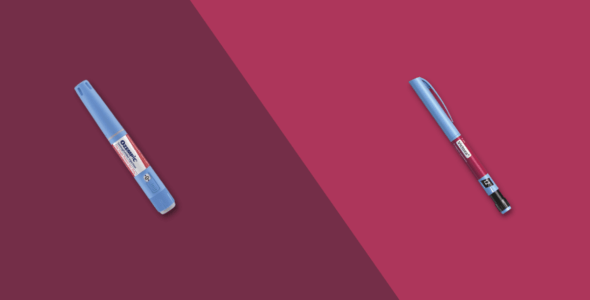Victoza side effects and how to avoid them
Table of contents
Victoza is a brand-name medication manufactured by Novo Nordisk. It is classed as a glucagon-like peptide-1 agonist (GLP-1) and is used to improve blood sugar levels in people with type 2 diabetes mellitus and reduce the risk of major cardiovascular events, such as heart attack and stroke. While Victoza is generally well tolerated, there are some potential side effects that people should be aware of. The most common side effects of Victoza include indigestion and constipation. Less common, but more serious side effects, can include serious allergic reactions.
Learn more about the side effects of Victoza and what you can do to avoid them.
What is Victoza (liraglutide)?
Victoza is manufactured by Novo Nordisk. It has FDA (Food and Drug Administration) approval to help control high blood sugar levels in people with type 2 diabetes. The active drug in Victoza is liraglutide, which is also the active ingredient in Saxenda.
RELATED: Saxenda vs Victoza
Victoza is usually prescribed when people can not control their blood sugar through diet and exercise alone, or if their diabetes medication isn’t effective. Victoza can be used alone or in combination with other diabetes medicines. Using Victoza may aid weight loss, and help to reduce body weight. This may be especially useful in those patients also suffering from obesity.
When you eat and digest food, sugar is released into your blood so it can be transported around your body. Your body absorbs the sugar out of your blood, returning your blood sugar to normal levels. In people with diabetes, their bodies struggle to control their blood sugar levels. Often their blood sugar is too high, and over time this can cause a range of problems, including nerve damage and heart disease. When injected, Victoza helps people with type 2 diabetes control their blood sugar levels in three ways:
- It helps your pancreas produce more insulin
- It reduces how quickly food moves through your stomach, slowing down the release of sugar into your blood
- It helps to stop your liver from releasing too much sugar into your blood
Always check with your doctor or pharmacist before taking any medication, including Victoza, to make sure it is safe for you.
Victoza dosage
Victoza is available as a subcutaneous injection, in the following doses: 6 mg/mL. Inject Victoza once daily at any time of day, in the abdomen, thigh, or upper arm. Administer separate injections when using insulin.
Initiate adult dosage at 0.6 mg daily for one week increasing to 1.2 mg daily. Increase the dose to 1.8 mg daily after one week of treatment with the 1.2 mg daily dose if further glycemic control is needed.
Initiate pediatric dosage at 0.6 mg daily for at least one week. Increase the dose to 1.2 mg daily if further glycemic control is needed. If additional glycemic control is still required, increase the dose to 1.8 mg daily.
You are advised to read the medication guide provided with this medicine for the drug information and patient information, and always speak with your healthcare provider for medical advice about any changes to your dose so they can monitor and evaluate your condition.
Victoza side effects
The most common possible side effects of Victoza in clinical trials include:
- Injection site reactions
- Nausea
- Diarrhea
- Decreased appetite
- Indigestion, and constipation
- Low blood glucose (hypoglycemia) – symptoms include confusion, drowsiness, blurred vision, sweating, slurred speech, fast heartbeat, irritability, and mood changes
- Headaches
- Anxiety
- Tremors
Victoza can cause more serious side effects, including:
- Symptoms of pancreatitis (inflammation of the pancreas)
- Difficult, burning, or painful urination
- Worsening of kidney failure and gallbladder problems
- Increased risk of thyroid tumors and medullary thyroid cancer (medullary thyroid carcinoma (MTC))
- Serious allergic reactions that can be life-threatening – symptoms include swelling of your face, lips, tongue, or throat, trouble breathing, shortness of breath, severe rash or itching, feeling fainting or dizzy, increased heart rate
If you experience any of these serious side effects, stop taking Victoza and seek medical attention immediately. You are encouraged to report negative side effects of prescription drugs to the FDA. Visit www.fda.gov/medwatch, or call 1-800-FDA-1088.
Victoza drug interactions
Victoza can interact with other medications including:
- Antibiotics for bacterial infections such as gatifloxacin
- Bexarotene used to treat skin cancer
- Any other diabetes medications, like insulin or sulfonylureas
- Diuretics, taken to make you lose water and salt, usually to treat high blood pressure – bumetanide, furosemide
- Corticosteroids such as cortisone and prednisolone
- Beta 2-stimulants, taken to treat asthma – salmeterol
- Estrogen-containing drugs including birth control and hormone replacements
- Steroids used topically (on the skin) such as betamethasone, clobetasol, hydrocortisone, and mometasone
Before taking Victoza, be sure to tell your doctor about all of the medications you are taking to ensure they are safe to take at the same time.
Victoza warnings & precautions
You should not use Victoza if you:
- Are allergic to the active ingredient liraglutide
- Are allergic to any of the other ingredients found in Victoza
- Have multiple endocrine neoplasia syndrome type 2 (MEN2)
- Have type 1 diabetes or diabetic ketoacidosis
Talk to your doctor before using Victoza if you:
- Have severe heart disease
- Have severe liver disease
- Have kidney problems such as kidney disease, or kidney failure or are on dialysis
- Have ever had cancer or have a family history of cancer
- Have a severe stomach or gut problem
- Have gallbladder disease
- Have gastroparesis
- Have inflammatory bowel disease
- Symptoms of acute pancreatitis (like a persistent, severe stomach ache)
- Have thyroid disease
- Are pregnant or are planning to become pregnant – Animal studies have shown that Victoza can harm a fetus
- Are breastfeeding or are planning to breastfeed
You should always check with your doctor or pharmacist before taking any medication, including Victoza, to make sure it is safe for you.
How to avoid Victoza side effects
The best way to avoid side effects is to take Victoza as directed by your doctor. Follow your doctor’s instructions carefully and do not take more or less than prescribed.
If you experience any side effects, talk to your doctor or pharmacist. They may be able to recommend ways to help reduce or prevent some of the side effects.
1. Stick to the recommended dosage
Take your prescribed dose of Victoza that has been recommended by your healthcare professional. Do not take more or less than prescribed.
2. Monitor your blood sugar levels
If you have diabetes, it is important to monitor your blood sugar levels closely while taking Victoza. Check your blood sugar levels as directed by your doctor and report any changes to your doctor immediately.
3. Drink plenty of fluids
Drink eight to 10 glasses of water or fluids every day to help prevent dehydration, which can make side effects worse.
4. Avoid alcohol
Avoid drinking alcohol while taking Victoza as it can increase your risk of side effects such as hypoglycemia.
5. Don’t skip meals
Eating regular meals and snacks will help to prevent low blood sugar levels (hypoglycemia).
6. Check your feet
If you have diabetes, check your feet for any cuts, sores, or redness regularly. Tell your doctor if you experience any problems with your feet while taking Victoza.
7. Know the signs and symptoms of Victoza side effects
Signs and symptoms of side effects include confusion, drowsiness, and slurred speech. If you experience any of these symptoms speak to your doctor.
8. Tell your doctor about all medications you’re taking
Be sure to tell your doctor about all other medications you’re taking, including over-the-counter drugs, vitamins, and herbal supplements, as they can interact with Victoza.
9. Get regular medical check ups
If you have diabetes it is important to get regular medical check ups and monitor your medical conditions. Your doctor will monitor your condition and may adjust your dose of Victoza as needed.
Medically reviewed
A medical professional has reviewed this article.


Jamie Winn, PharmD
Jamie Winn, PharmD
Dr. Jamie Winn received his Doctor of Pharmacy in 2002 from the University of South Carolina College of Pharmacy, Columbia, SC. Jamie is a medical reviewer for NiceRx.





